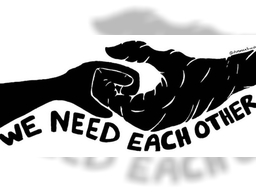Please join us for two workshops (one virtual and one in person) designed by Humanities Action Lab (HAL), a coalition of universities, issue organizations, and public spaces in 40 cities that is based out of Rutgers University-Newark. HAL’s Learning & Coalition Facilitator Leora Fuller will explore and share the core tenets of “mutual aid storytelling,” a concept collaboratively developed by members of the HAL network over the past two years. This idea recognizes that sharing both basic and complex stories about our lives is crucial to getting to know the needs of those around us, connecting how these needs are shared, mutually supporting each other in meeting them, and building solidarity to fight for systemic change.
In the March 3rd virtual workshop, participants will meet six mutual aid organizers, students, and faculty who work with the concept and currently practice mutual aid storytelling. They will share the unique ways they have reoriented public history to focus on intra-community stories. We will learn from knowledge bearers building networks of care in Newark, NJ, organizing mutual aid with undocumented and mixed status families in California’s San Joaquin Valley, and creating alternatives to the failed Puerto Rican government response to Hurricane Maria and other disasters. Click on the links below to read more about their efforts: The March 31st in-person workshop (part two) will introduce the idea of “mutual mentorship,” which is a way to build mutually supportive learning relationships in our classrooms, organizations, and the rest of our lives. Participants will connect with a mutual mentor within the session, tell each other stories about their shared needs, and imagine ways to build towards futures of solidarity and radical change. Together we’ll grow collaborative relationships in the region with institutions and community partners who are dedicated to ethical, sustainable and mutually supportive action. In these two HTLabs, participants will learn strategies for Reconceptualizing the role of public history as an intra-community process of relationship building Exploring what mutual mutual aid and direct action storytelling can look like Facilitating translocal learning: collective learning in which participants are grounded in their localities but exchanging and learning together Offering new mutually supportive models for collaborative learning that center specific community needs and sustainable relationships Centering the need for public history to support direct impacts on unequal resource distribution, structural oppression, and systemic violence Developing models of resource advocacy and distribution led by faculty within universities to directly challenge institutional harm and support local, material change
Registration is required to attend the virtual HTLab. Please register by Monday, February 27th.
NOTE: Registration for the in-person lab on March 31st will begin in early March. Attendance at both labs, while encouraged, is not required in order to participate.
Questions? Contact Viridiana Colosio-Martinez, Inclusion Imperative Associate: vcolosi1@umbc.edu. If you are unable to attend, but would like to access a recording of the workshop, please contact Viridiana Colosio-Martinez. |

